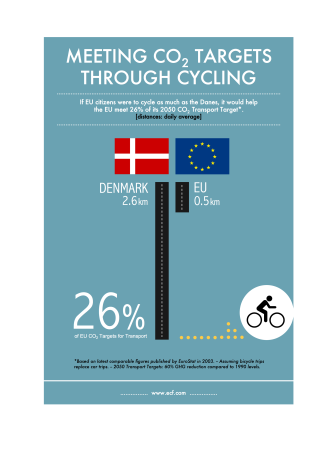
Cycling: A Simple Solution, To a Rather Nasty Problem
Why is it that the transport sector is failing miserably when it comes to cutting emissions? ECF policy officer, Benoit Blondel reports live from Velo-city in Vancouver.
I’ve just given a presentation at Velo-city in Vancouver, and I really hope that North America was listening closely. As last week's RIO +20 fell flat on its face, it’s time for the world’s bicycle advocates to step up to the challenge. It’s time for us to see how cycling can reshape a very dirty, fossil fuel dependant transport sector.
Chatting to many North Americans, they often see Europe as the mecca of eco-friendly politics. But all is not as it seems. True, Europe has been actively trying to reduce its greenhouse gas emissions, and they’ve seen experienced success in most sectors. But transport is hurting gains made in other sectors. It currently makes up a quarter of all emissions, it's dirty footprint is second only to the energy sector. The share of transport sector GHG emissions is indeed not only big but also getting bigger at a fast rate. At the EU level, between 1990 and 2007, emissions of all sectors bar transport fell by 15%, whereas transport emissions actually increased by 36% in the same period. If the current trend continues, transport may just be the downfall of us all.
The Bicycle: A Simple Solution to a Complicated Problem.
Meanwhile, the EU agreed to cut overall EU GHG emissions by 80-95% by 2050 compared to 1990 levels. Such a target can only be met if transport emissions are also drastically reduced: the EU set a GHG emissions reduction target specific to transport of -60%.
In a misguided way, many politicians believe that the answer is electric vehicles. Technology, they believe will save the day. But this kind of thinking is short-sighted. There’s no one policy which will solve it all. It’s going to take a more multi-faceted approach, and believe it or not, cycling has a huge role to play.
At Velo-city, I outlined a study I produced late last year. If Europe cycled as much as the Danes, we’d be able to achieve 25% of the the 2050 CO2 transport target.
Cycle 5km a day and we’ll reach 50% of the target
Many participants at the conference took note. If they can get the world’s leaders to see that cycling can reshape the transport sector, then the future for cycling is looking good.
 About the Author
About the Author
Benoit Blondel is the Environment Policy Officer for ECF. He's the author of ECF's famous CO2 Study.
Live Coverage from Velo-city
ECF is reporting this story live fom the world’s largest cycling policy in Vancouver, Canada where nearly 1,000 of the cycling world’s best and brightest have gathered for four days to talk cycling. You can read more stories from our Velo-city live page and tweet #velocity2012 to join in the conversation.
Contact the author
Recent news!
Upcoming events
Contact Us
Avenue des Arts, 7-8
Postal address: Rue de la Charité, 22
1210 Brussels, Belgium











